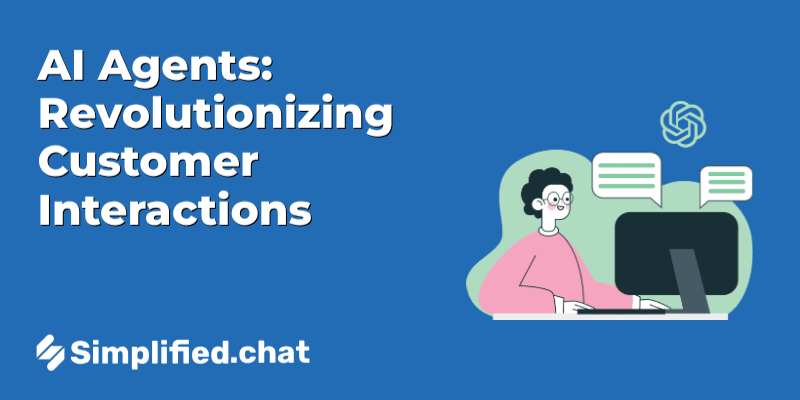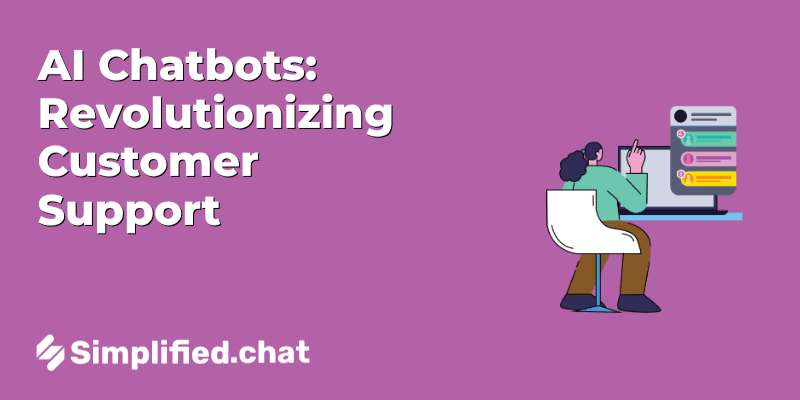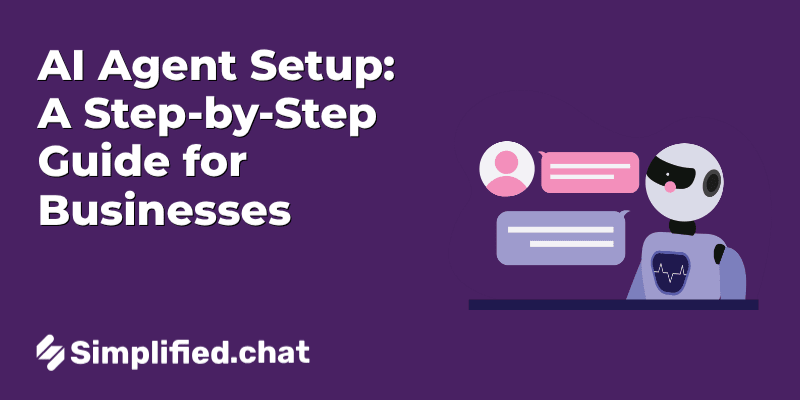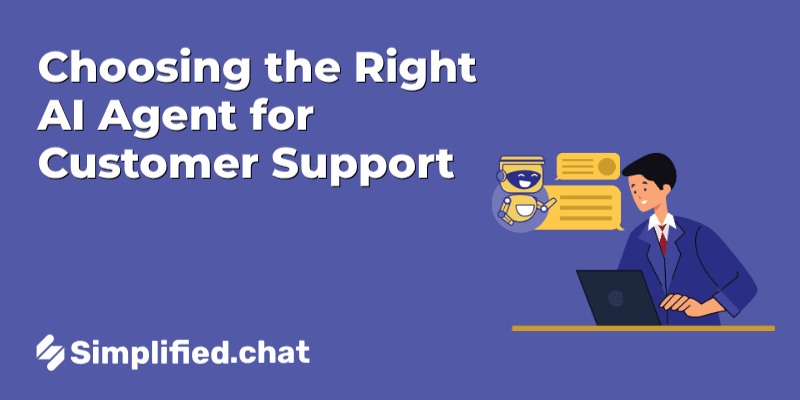Table Of Content
How Are AI Agents Enhancing Customer Interactions?
AI agents are transforming the way businesses engage with customers by providing support that is personalized, efficient, and continuously available. These intelligent systems use natural language processing and machine learning to carry out conversations that understand customer needs and offer relevant solutions accurately and promptly. Through platforms such as WhatsApp and Facebook Messenger, AI chatbots handle a wide range of tasks from answering frequent questions to guiding customers through complex requests, improving overall service quality.
AI agents are intelligent systems designed to interact with customers, understand their needs, and provide relevant solutions or information. They use natural language processing (NLP) and machine learning (ML) to engage in conversations, automate tasks, and personalize experiences.
According to a McKinsey report titled "The future of customer experience: Embracing agentic AI", AI agents are set to redefine customer engagement by enabling systems that autonomously make decisions and take actions. The report features multiple case studies highlighting AI’s effectiveness in tailoring customer interactions and streamlining service operations, resulting in heightened customer satisfaction and loyalty.
The Evolving Role of AI in Customer Service

From Basic Chatbots to Intelligent Agents
The customer service landscape has transformed significantly over the past decade. What began as simple, scripted chatbots capable of answering limited questions has now evolved into sophisticated AI-powered agents. Early chatbots primarily followed preset rules, offering basic responses to repetitive inquiries. While these were helpful for straightforward tasks such as providing business hours or tracking order status, they often frustrated users when faced with more complex issues.
Today’s intelligent agents utilize natural language processing (NLP), machine learning, and context awareness to engage in more natural conversations. They can understand the intent behind customer inquiries, handle multi-turn dialogues, and even anticipate follow-up questions. This evolution has moved AI from a rigid tool to a dynamic assistant capable of better emulating human conversation patterns.
Understanding the Capabilities of Modern AI Agents
Modern AI agents bring several new capabilities that greatly improve customer interactions:
- Contextual Understanding: They analyze prior interactions and customer data to provide personalized responses rather than generic answers.
- Multi-channel Support: These agents operate across platforms—chat, email, social media, and even voice—ensuring a coherent customer experience regardless of how the customer reaches out.
- Proactive Assistance: Beyond reactive support, AI agents can initiate conversations based on behavior triggers, such as offering help when a user lingers too long on a webpage or providing updates about service disruptions.
- Seamless Escalation: When an issue exceeds the AI’s scope, it can smoothly transfer the conversation to human representatives while passing along relevant context to avoid repetition.
- Continuous Learning: AI systems improve over time by incorporating feedback and analyzing new data, refining their responses and effectiveness.
Benefits of Implementing AI Agents in Customer Support
Integrating AI agents into customer service yields tangible advantages that extend to both businesses and customers:
- Increased Availability: AI agents provide round-the-clock support, giving customers immediate assistance outside traditional business hours.
- Operational Efficiency: Automating routine inquiries frees up human agents to focus on complex cases, improving overall response quality and reducing burnout.
- Consistency and Accuracy: AI delivers uniform answers that adhere to company policies, minimizing human error and maintaining brand voice.
- Scalability: Unlike human teams, AI agents can handle large volumes of interactions simultaneously without compromising speed or quality.
- Actionable Insights: AI analytics help identify common pain points and trends in customer behavior, providing data-driven opportunities to enhance products and services.
As AI technology continues to mature, its role in customer service will likely deepen, blending human empathy with machine precision to create seamless support experiences. Businesses that understand and adopt these AI capabilities early can better meet evolving customer expectations in an increasingly digital world.
Case Study: How AI Agents Are Transforming E-commerce

Personalized Shopping Experiences with AI
E-commerce platforms have increasingly adopted AI agents to tailor the shopping journey to individual customers. By analyzing browsing patterns, purchase history, and even external data like seasonal trends, AI can dynamically curate product recommendations that resonate on a personal level. This enhances customer satisfaction by reducing the noise of irrelevant options and helping shoppers discover products they might not find otherwise.
For example, some retailers use AI chatbots that interact with shoppers in real time, asking clarifying questions to narrow down choices or suggesting complementary products. Studies show that personalized interactions lead to higher conversion rates, as customers feel understood and valued rather than facing generic catalogs.
Automated Order Tracking and Support
One of the pain points in online shopping is the uncertainty around order status and delivery timelines. AI agents have stepped in to streamline this aspect by providing instant, automated updates and addressing common customer queries 24/7. Instead of waiting on hold or searching through emails, consumers can ask an AI assistant for real-time tracking details or troubleshoot issues like returns and refunds.
These AI-powered support systems not only reduce the workload on human agents but also ensure consistency in communication and faster resolution times. As mentioned by recent industry reports, automated support contributes significantly to improving post-purchase customer experience, a critical window for building long-term loyalty.
Boosting Sales Through Proactive Recommendations
Beyond reactive suggestions, AI agents are becoming proactive sales facilitators. By monitoring live shopping sessions and combining this with predictive analytics, these agents can recommend timely offers, upsells, or bundles tailored to the shopper’s current interests and behavior. This approach taps into real-time signals rather than relying solely on historical data.
Retailers implementing this proactive strategy report increased average order values and engagement rates. For instance, if a customer adds a camera to their cart, the AI might suggest accessories like lenses or tripods with special discounts, prompting additional purchases without feeling intrusive.
Together, these AI-driven tactics provide a comprehensive enhancement to the e-commerce ecosystem—making shopping smoother, more engaging, and ultimately more profitable for businesses willing to adopt them thoughtfully.
Case Study: AI Agents Transforming Healthcare Services

Appointment Scheduling and Reminders
One of the most straightforward yet impactful applications of AI agents in healthcare is automating appointment scheduling. By integrating natural language processing and calendar management, AI systems can handle patient requests for booking, rescheduling, or canceling appointments efficiently. This automation reduces administrative burdens and human error, allowing staff to focus more on patient care.
Moreover, AI agents can send timely reminders through texts or emails, which minimizes no-show rates. Studies indicate that consistent reminders significantly improve attendance and patient punctuality. This not only optimizes healthcare providers’ schedules but also enhances patient satisfaction by reducing wait times and last-minute changes.
Providing Initial Medical Information and Triage
AI agents are increasingly used for initial patient interaction, delivering preliminary medical information and performing triage assessments. When patients describe symptoms to an AI system, it can analyze the input, often referencing up-to-date clinical guidelines and databases, to suggest potential conditions or urgency levels.
This early intervention helps direct patients to the appropriate care level—whether self-care advice, scheduling a primary care visit, or seeking emergency treatment. By streamlining this process, healthcare systems can reduce unnecessary emergency room visits and better allocate medical resources. Importantly, these systems serve as assistants rather than replacements for clinicians, enhancing decision-making rather than substituting it.
Enhancing Patient Engagement and Adherence
Maintaining patient engagement is a critical challenge, especially in managing chronic conditions or following complex treatment plans. AI agents can provide personalized follow-ups, educational content, and encouragement tailored to each patient’s needs and behaviors.
For example, AI-powered chatbots can monitor medication adherence by sending reminders and checking in on side effects or concerns. This continuous digital support has been linked to improved treatment outcomes in multiple studies. Additionally, AI tools can adapt communication styles based on patient responses, creating a more empathetic and motivating experience.
In summary, these use cases illustrate how AI agents are not merely technical novelties but practical tools that enhance efficiency, decision-making, and patient experience across the healthcare journey.
Case Study: AI Agents Transforming Education

Answering Student Queries and Providing Support
One of the immediate benefits of AI agents in education is their role as round-the-clock assistants for students. These AI systems can handle a wide range of queries—from straightforward factual questions to guidance about coursework and deadlines. Unlike traditional support channels, AI agents deliver instant responses, reducing wait times and helping students stay engaged.
Furthermore, these agents can be programmed to recognize when a question requires escalation to human instructors, ensuring that complex or sensitive issues receive personalized attention. This hybrid model enhances overall student support without overwhelming educators.
Personalized Learning Paths and Recommendations
AI's ability to analyze individual performance data allows it to craft customized learning experiences. By monitoring student progress, strengths, and areas needing improvement, AI agents suggest tailored resources, exercises, or topics. This approach aligns with educational research emphasizing differentiated instruction as a key factor in improving learning outcomes.
For example, if a student struggles with a specific math concept, the AI might recommend supplementary tutorials or interactive activities targeting that area. This personal adaptation helps maintain motivation and fosters a deeper understanding.
Automated Grading and Feedback
The grading process often consumes significant instructor time, especially with large class sizes. AI agents have been used effectively to automate grading for multiple-choice and short-answer assessments, and increasingly for essay evaluations through advanced natural language processing techniques.
Beyond speed, automated feedback systems provide consistent, objective evaluations while generating personalized comments to guide improvement. Studies have found that timely and detailed feedback is crucial for student development, and AI can facilitate this even in resource-constrained settings.
However, AI grading is most effective when combined with human oversight to ensure fairness and contextual understanding—particularly in subjective assignments.
Implementing AI Agents: Best Practices for Success

Defining Clear Goals and Objectives
Before integrating an AI agent into your workflow, it’s essential to establish precise goals. Defining what you want the AI to achieve sets the foundation for every subsequent decision—be it platform selection, data preparation, or performance evaluation. Vague ambitions rarely translate into meaningful outcomes with AI.
Consider breaking down your goals into specific, measurable objectives. For example, instead of aiming to “improve customer service,” set a target like “reduce average response time by 30% within three months.” This clarity helps assess progress effectively and ensures all stakeholders share the same expectations.
Choosing the Right AI Platform and Tools
Selecting an AI platform isn’t just about brand prominence or buzzword appeal; it’s about matching your project’s technical requirements and scalability needs. Factors such as ease of integration, customization capabilities, support for your data types, and budget constraints all play vital roles.
Start by evaluating options based on:
- The learning curve for your team
- Compatibility with existing systems
- Available pre-trained models or frameworks
- Community support and documentation quality
- Security features and compliance with regulations
Take advantage of trial periods or sandbox environments to test the platforms in real use cases. This hands-on experience often reveals nuances that no marketing materials can.
Training and Optimizing Your AI Agent
Training is where your AI agent learns to perform effectively. High-quality, representative data is critical; biased or incomplete data will lead to subpar or skewed results. Spend time curating and preprocessing your datasets before training begins.
Optimization isn’t a one-and-done task either. Iterative refinement through tuning parameters, adding data, and employing feedback loops ensure your AI agent adapts accurately to evolving needs.
Practical steps include:
- Validating model outputs regularly to catch errors early
- Employing performance metrics relevant to your objectives (e.g., accuracy, recall, precision)
- Incorporating user feedback to adjust behaviors and improve responsiveness
- Establishing monitoring processes to detect drift or degradation over time
By carefully following these best practices, you create a solid path toward AI agent implementations that deliver tangible benefits and align well with your organizational goals.
Enhancing Customer Support with AI Agents: Your Next Step
AI agents are playing an increasingly important role in improving customer interactions, boosting efficiency, and providing actionable insights across industries. By integrating AI-driven chatbots through platforms like Simplified.chat, businesses can offer prompt and tailored support that helps customers while optimizing operational resources. To begin exploring how AI agents can support your organization’s objectives, visit Simplified.chat and discover how to create an AI customer support solution designed for your business needs.
Empower Your Business with Simplified AI Chatbot
Build Your Own AI ChatbotBuild Your First AI Agent Today
Build, train, customize and deploy your first AI chatbot in minutes




